In ‘Lectures on Language, as Particularly Connected with English Grammar, ‘ William Stevens Balch meticulously explores the intricacies of the English language, examining grammatical structures and their historical evolution. Balch adopts a didactic literary style, presenting complex linguistic concepts in an accessible manner, ideal for both student and educator alike. His lectures emphasize the relationship between language and thought, situating his discourse within the broader context of 19th-century linguistics, when the study of language was becoming increasingly systematic and scientific. Through examples and analyses, Balch illuminates common grammatical pitfalls, advocating for a more nuanced understanding of language as a vital tool for communication. William Stevens Balch, an esteemed educator and linguist, drew upon his background in language studies to craft this seminal work. His experiences as a teacher and passion for linguistics undoubtedly influenced his desire to enhance grammar education in an era marked by rapid societal change and the rise of formalized language instruction. Balch’s commitment to clarity and precision reflects his belief in the importance of mastering language as a foundation for intellectual development. This book is highly recommended for educators, students, and anyone interested in deepening their understanding of English grammar. Balch’s insightful analyses and practical approach make it an invaluable resource for those seeking to refine their linguistic skills and appreciate the broader implications of language in society.
Yazar hakkında
William Stevens Balch (1806–1887) was an American minister, educator, and writer known for his contributions to education and linguistics. Born in New York, Balch was a dedicated scholar from an early age, eventually becoming an influential Unitarian preacher. His passion for education led him to explore various aspects of language and grammar, an interest that culminated in his notable work, ‘Lectures on Language, as Particularly Connected with English Grammar’. The book reflects his dedication to understanding the intricacies of language and its role in intellectual development. Balch’s literary style was didactic, characterized by clear exposition and a belief in education as a tool for moral and civic improvement. His lectures and writings often combined a deep knowledge of linguistics with a philosophical approach to education, which aimed not only to instruct but also to enrich the lives of his readers. His contributions to the field of education and linguistics remain an integral part of scholarly discussions regarding effective language instruction and the philosophy of educating the mind through language mastery.












